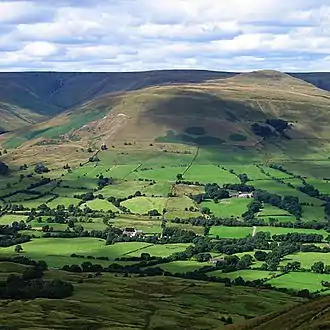| Crook Hill | |
|---|---|
 The twin summits of Crook Hill above Ladybower Reservoir | |
| Highest point | |
| Elevation | 382 m (1,253 ft) |
| Prominence | c. 84 m |
| Coordinates | 53°22′42″N 1°43′33″W / 53.3782°N 1.7258°W |
| Geography | |
| Location | Peak District, England |
| Parent range | Pennines |
| OS grid | SK182871 |
| Topo map | OS Landranger 110 |

Crook Hill is a small hill in the Peak District National Park in the English county of Derbyshire, 5 kilometres (3.1 mi) northeast of Castleton.
Overview
The hill is situated above the A57 Snake Pass road between Sheffield and Manchester as it passes Ladybower Reservoir. Crook Hill is regarded as an outlier of Kinder Scout although the two are separated by the long western arm of Ladybower Reservoir. The hill has twin summits, the highest of which reaches a modest height of 382 metres (1,253 ft) while the secondary top (sometimes referred to as Ladycrook Hill, although this name does not appear on Ordnance Survey maps) attains an altitude of 374 metres (1,227 ft). Geologically, the hill consists of Kinder Scout Grit, a kind of sandstone.[1] Both the hill's summits give excellent views of the surrounding countryside with Ladybower Reservoir, Derwent Edge and Win Hill being the main attractions. Between the two summits there is some evidence of an ancient megalithic standing stone circle. The circle originally consisted of five stones around a surviving mound of which only two are still upright.[2]
Ascents
Crook Hill is normally climbed from the Derwent valley road just as it leaves the A57: a bridleway leaves the small car park at grid reference SK190871 and climbs steeply and muddily up to Crookhill Farm, a working sheep farm owned by the National Trust which also offers accommodation to tourists. Once the farm is passed, a stile is climbed onto the open sheep pasture and it is then a straightforward walk to the two twin summits, which are on designated access land.[3]
References
- ↑ Fred Wolverson Cope (1998). Geology Explained in the Peak District. Scarthin Books. p. 167. ISBN 0-907758-98-3.
- ↑ "Crook Hill (Stone Circle)". www.themodernantiquarian.com. Retrieved 10 August 2012.
- ↑ OL1 The Dark Peak (Map). 1:25000. Explorer. Ordnance Survey. Archived from the original on 4 March 2016. Retrieved 10 August 2012.
